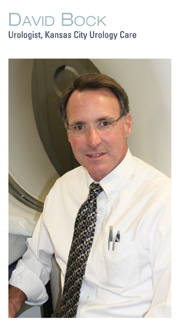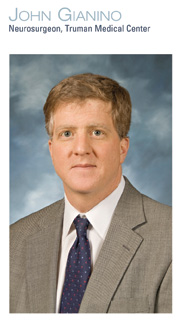
Ask almost any obstetrician about the real rewards of his or her work, and you’ll most likely hear about that moment in the delivery room when a new life enters the world. David Bock knows something about that feeling—even though, as a urologist, he can be working nine months farther up the production line.
“I’ve had a handful of patients with significant testicular cancers that we’ve been able to treat successfully, who have gone on to have children. Those are the type of patients where you know you’ve made a difference,” he said. He recalls treatment of one young man whose diagnosis came not long after he’d become engaged. “We went to his wedding, and they even sent me pictures of their fist two kids,” Bock says.
Based out of Kansas City Urology Care’s Leawood office, Bock is on staff at Menorah and St. Joseph medical centers. A native of Oklahoma City, he’s one of the few people you might find with divided loyalties at a Red River Rivalry game: Undergrad from the University of Texas, medical schooling at the University of Oklahoma. He broke the tie in his medical education
by doing his residency at the Mayo Clinic, where he chose to focus on urology. That specialty held a particular appeal, he said, because it offered a blend of both office consultation and surgical practice.
“We have the opportunity to do a lot of very interesting procedures, major cancer procedures, combinations of open and minimally invasive surgeries,” he said, “but at the same time, you get to follow your patients over a number of years and develop relationships.” And that part is key, because “from day one, including today, my view is that I work for my patients,” Bock says.
“Being patient-centered is the key to a successful medical practice. I always figured that if you do the right thing for the patient, everything else will follow suit. You’ll build your reputation and your practice—and you can sleep at night.”

For some physicians, the act of healing is the reward. John Gianino gets that, but he draws additional fulfillment from the type of patient he sees as the lone full-time neurosurgeon at Truman Medical Center. “Helping those who are less fortunate, I have received tenfold more than I could ever hope to give,” he says. “What excites me most is not only caring for the individual patient, but also finding opportunities to utilize the limited resources we have to provide access to an entire population of people who may not have the opportunity to receive care elsewhere.”
There’s no shortage of such need at an urban hospital, which Gianino tries to meet in clinical settings, in surgical settings, and in administrative settings—he’s also president of the medical staff and medical director for the hospital’s surgery clinics. And, as a professor at the University of Missouri–Kansas City’s School of Medicine, he’s extending his reach by educating the next gen-eration of physicians. Those endeavors, and more, made him the choice of his peers to become the next president of the Metropolitan Medical Society of Greater Kansas City.
A native of St. Louis, he spent 15 years in the Chicago area, starting both a career and a family. But a yearning to do something more clicked with his medical school background [he’s a UMKC grad], bringing him to Truman in 2003. This area’s appeal as a place to raise a family, the chance to contribute more to a community and the opportunity to teach made it the perfect place.
Validation for choosing a career in medicine, he says, shows up nearly every day, often in small ways. “It’s the patient who wakes up from a surgery that decompresses a nerve and relieves the severe pain they suffered with for months,” he says. “It’s even being able to improve or prolong the life of a patient with brain cancer. It’s the everyday small events that continue to reveal to me that I am humbled to be able to do what I do.”